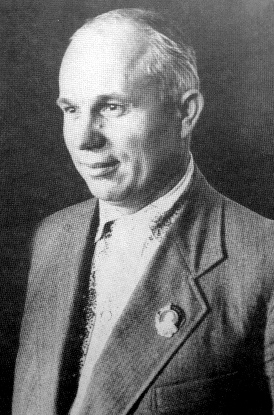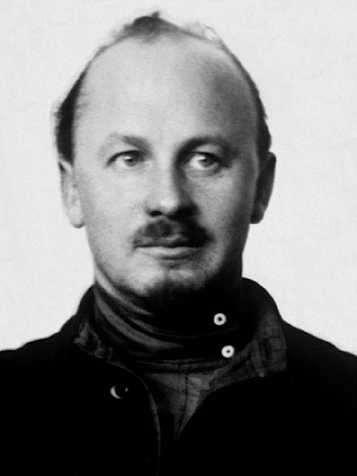|
Vyacheslav Molotov
Vyacheslav Mikhaylovich Molotov (; – 8 November 1986) was a Soviet politician, diplomat, and revolutionary who was a leading figure in the government of the Soviet Union from the 1920s to the 1950s, as one of Joseph Stalin's closest allies. Molotov served as Chairman of the Council of People's Commissars (head of government) from 1930 to 1941, and as Minister of Foreign Affairs from 1939 to 1949 during the era of the Second World War, and again from 1953 to 1956. An Old Bolshevik, Molotov joined the Russian Social Democratic Labour Party in 1906 and was arrested and internally exiled twice before the October Revolution of 1917. He briefly headed the party's Secretariat before supporting Stalin's rise to power in the 1920s, becoming one of his closest associates. Molotov was made a full member of the Politburo in 1926 and became premier in 1930, overseeing Stalin's agricultural collectivization (and resulting famine) and his Great Purge. As foreign minister from 1939, Mo ... [...More Info...] [...Related Items...] OR: [Wikipedia] [Google] [Baidu] |
Polina Zhemchuzhina
Polina Semyonovna Zhemchuzhina. (born Perl Solomonovna Karpovskaya; 27 February 1897 – 1 April 1970) was a Soviet politician and the wife of the Soviet foreign minister Vyacheslav Molotov. Zhemchuzhina was the director of the Soviet national cosmetics trust from 1932 to 1936, Minister of Fisheries in 1939, and head of textiles production in the Ministry of Light Industry from 1939 to 1948. In 1948, Zhemchuzhina was arrested by the Soviet secret police, charged with treason, and sent into internal exile, where she remained until after the death of Joseph Stalin in 1953. Biography Zhemchuzhina was born Perl Solomonovna Karpovskaya to the family of a Jews, Jewish tailor Solomon Karpovsky in the village of Polohy, in the Alexandrovsky Uyezd (Yekaterinoslav Governorate), Alexandrovsky Uyezd (today Zaporizhzhia Oblast, Ukraine). She joined the Russian Social Democratic Labour Party of Bolsheviks in 1918 and served as a propaganda commissar in the Red Army during the Russian Civil W ... [...More Info...] [...Related Items...] OR: [Wikipedia] [Google] [Baidu] |
Vyacheslav Nikonov
Vyacheslav Alekseyevich Nikonov (; born 5 June 1956) is a Russian political scientist. Early life Nikonov is a grandson of Vyacheslav Molotov, prominent Bolshevik and Soviet foreign minister under Joseph Stalin, whom he was named after, and Polina Zhemchuzhina, a Soviet politician. Education Nikonov graduated from the History Department of Moscow State University in 1978 where he studied the history of the Republican Party in the United States after World War II. In July 2012, Nikonov received an Honorary Doctorate of Letters from the University of Edinburgh, which has since been rescinded. Career Nikonov has been involved in Soviet and Russian politics since the 1970s, first as a local Komsomol leader, later in the Communist Party of the Soviet Union, and as a member of Mikhail Gorbachev, Boris Yeltsin, and Vladimir Putin's staff. In 1993, Nikonov was elected to the State Duma. In 2005–2007, he was a member of the Public Chamber of Russia. Since 2007, N ... [...More Info...] [...Related Items...] OR: [Wikipedia] [Google] [Baidu] |
11th Politburo And The 11th Secretariat Of The Russian Communist Party (Bolsheviks)
The Politburo of the 11th Congress of the Russian Communist Party (Bolsheviks) was in session from 2 April 1922 to 25 April 1923. Composition Members Candidates References Notes {{Communist Party of the Soviet Union Politburo of the 11th Congress of the Russian Communist Party (Bolsheviks) ... [...More Info...] [...Related Items...] OR: [Wikipedia] [Google] [Baidu] |
10th Politburo And The 10th Secretariat Of The Russian Communist Party (Bolsheviks)
The Politburo of the 10th Congress of the Russian Communist Party (Bolsheviks) was in session from 16 March 1921 to 3 April 1922. Composition Members Candidates References Notes {{Communist Party of the Soviet Union Politburo of the 10th Congress of the Russian Communist Party (Bolsheviks) ... [...More Info...] [...Related Items...] OR: [Wikipedia] [Google] [Baidu] |
Presidium Of The Central Committee Of The Communist Party Of The Soviet Union
The Political Bureau of the Central Committee of the Communist Party of the Soviet Union, abbreviated as Politburo, was the de facto highest executive authority in the Communist Party of the Soviet Union (CPSU). While elected by and formally accountable to the Central Committee, in practice the Politburo operated as the ruling body of Soviet Russia and the Soviet Union from its creation in 1919 until the party's dissolution in 1991. Full members and candidate (non-voting) members held among the most powerful positions in the Soviet hierarchy, often overlapping with top state roles. Its duties, typically carried out at weekly meetings, included formulating state policy, issuing directives, and ratifying appointments. The Politburo was originally established as a small group of senior Bolsheviks shortly before the October Revolution of 1917, and was re-established in 1919 to decide on urgent matters during the Russian Civil War. It operated on the principles of democratic centra ... [...More Info...] [...Related Items...] OR: [Wikipedia] [Google] [Baidu] |
20th Presidium Of The Communist Party Of The Soviet Union
The Presidium of the 20th Congress of the Communist Party of the Soviet Union (CPSU) was in session from 1956 to 1961. Composition Members Candidates References {{Communist Party of the Soviet Union Presidium of the 20th Congress of the Communist Party of the Soviet Union ... [...More Info...] [...Related Items...] OR: [Wikipedia] [Google] [Baidu] |
19th Presidium Of The Communist Party Of The Soviet Union
The Presidium of the 19th Congress of the Communist Party of the Soviet Union (CPSU) was in session from 1952 to 1956. Composition Members Candidates Organs of the 19th Presidium (dissolved in March 1953) ;Bureau of the Presidium * Lavrentiy Beria (1889–1953) * Nikolai Bulganin (1895–1975) * Kliment Voroshilov (1881–1969) * Lazar Kaganovich (1893–1991) * Georgy Malenkov (1902–1988) * Mikhail Pervukhin (1904–1978) * Maksim Saburov (1900–1977) * Joseph Stalin (1878–1953) * Nikita Khrushchev (1894–1971) ;Standing Committee on Ideological Questions * Aleksey Rumyantsev (1905–1993) — Chairman from 18 November 1952 until 23 March 1953. * Mikhail Suslov (1902–1982) * Dmitry Chesnokov (1910–1973) * Dmitry Shepilov (1905–1995) — Chairman from 10 October 1952 until 18 November 1952. * Pavel Yudin (1899–1968) ;Standing Committee on Defense * Lavrentiy Beria (1899–1953) * Nikolai Bulganin (1895–1975) — Chairman from 10 October 1952 u ... [...More Info...] [...Related Items...] OR: [Wikipedia] [Google] [Baidu] |
18th Politburo Of The All-Union Communist Party (Bolsheviks)
The Politburo of the 18th Congress of the All-Union Communist Party (Bolsheviks) was in session from 1939 to 1952. Composition Members Candidates References {{Communist Party of the Soviet Union Politburo of the 18th Congress of the All-Union Communist Party (Bolsheviks) ... [...More Info...] [...Related Items...] OR: [Wikipedia] [Google] [Baidu] |
17th Politburo Of The All-Union Communist Party (Bolsheviks)
17 (seventeen) is the natural number following 16 and preceding 18. It is a prime number. 17 was described at MIT as "the least random number", according to the Jargon File. This is supposedly because, in a study where respondents were asked to choose a random number from 1 to 20, 17 was the most common choice. This study has been repeated a number of times. Mathematics 17 is a Leyland number and Leyland prime, using 2 & 3 (23 + 32) and using 4 and 5, using 3 & 4 (34 - 43). 17 is a Fermat prime. 17 is one of six lucky numbers of Euler. Since seventeen is a Fermat prime, regular heptadecagons can be constructed with a compass and unmarked ruler. This was proven by Carl Friedrich Gauss and ultimately led him to choose mathematics over philology for his studies. The minimum possible number of givens for a sudoku puzzle with a unique solution is 17. Geometric properties Two-dimensions *There are seventeen crystallographic space groups in two dimensions. These are som ... [...More Info...] [...Related Items...] OR: [Wikipedia] [Google] [Baidu] |
16th Politburo Of The All-Union Communist Party (Bolsheviks)
The Politburo of the 16th Congress of the All-Union Communist Party (Bolsheviks) was in session from 1930 to 1934. Composition Members Candidates References {{Communist Party of the Soviet Union Politburo of the 16th Congress of the All-Union Communist Party (Bolsheviks) ... [...More Info...] [...Related Items...] OR: [Wikipedia] [Google] [Baidu] |
15th Politburo Of The All-Union Communist Party (Bolsheviks)
The Politburo of the 15th Congress of the All-Union Communist Party (Bolsheviks) was in session from 1927 to 1930. Composition Members Candidates References {{Communist Party of the Soviet Union Politburo of the 15th Congress of the All-Union Communist Party (Bolsheviks) ... [...More Info...] [...Related Items...] OR: [Wikipedia] [Google] [Baidu] |
14th Politburo Of The All-Union Communist Party (Bolsheviks)
The Politburo of the 14th Congress of the All-Union Communist Party (Bolsheviks) was in session from 1 January 1926 to 19 December 1927. Composition Members Candidates References Notes {{Communist Party of the Soviet Union Politburo of the 14th Congress of the All-Union Communist Party (Bolsheviks) ... [...More Info...] [...Related Items...] OR: [Wikipedia] [Google] [Baidu] |








